
'•Vi !
48 BENEDICTINE PRIORY.
in a ravine to the right of the road, just
below the hermitage, where we were glad
to repose after our long walk.
The Benedictine Priory is built in the
usual bad style of Savoyard architecture.
There is nothing venerable or imposing in
its appearance ; it bears no resemblance to
the ruins of our English abbeys. The side
next the lake is partly concealed from view
by a deep grove of walnut and chesnut-
trees.
This priory, when first founded, was
celebrated for the regularity and sanctity
of the monks, who supplied the Bomish
calendar with several doughty or doubtful
saints ; such as St. Germain, who flourished
in 967, St. Kulp in 1018, and St. Jorex in
1107. Notwithstanding these venerable
examples, the discipline of this priory in
later times became very relaxed, like that
of other monasteries ; but on the establishment
of the Beformation at Bern and
Geneva, the catholic ecclesiastics in Savoy
were aroused from their epicurean lethargy
to contemplate the dangers by which they
were menaced, when like “ the little fat
round oily man of God,” in the Castle of
Indolence,
REFORMATION OF THE CLERGY. 49
“ They sunk into their pew,
“ And straight did recollect their piety anew.’’*
A large mansion, formerly belonging to
the family of Bertholet, is the most conspicuous
building in Talloires, as seen from
Chateau Duing. It was here that the justly
celebrated chemist Bertholet was born and
passed the early years of his life. There is a
peculiar appearance of seclusion united with
cheerfulness in the situation of Talloires, and
* A reformation somewhat analogous may have beeri
observed of late years in our own country, and those who
lament the spread of methodism, would do well to comfort
themselves with the reflection, that the race of
Parsons Trulliber and Barnabas described by Fielding,
and so common in the last century, has nearly disappeared
from the land ; and even the sporting divines of
Mr. Crabbe,
“ Those jovial youths, who think their Sunday’s task,
“ As much as God or man can fairly ask,”
are less frequently met with in society than formerly.
Can any one doubt that the established church
has gained more real strength by the increased respectability
of the country clergy, than it has lost by the
secession of a part of its nominal members, many of
whom may be more properly styled seceders from the
alehouse, than dissenters from the church? In saying
this, I mean no disrespect to the methodists ; it
is highly to the credit of that sect that they have been
eminently successful in reforming the lower classes in
many parts of England, where the instruction of the
poor had been greatly neglected.
VOL. I. E
tí'
r h
t-
'« I
m
Ai.-3i
I. II ' “il
; .t